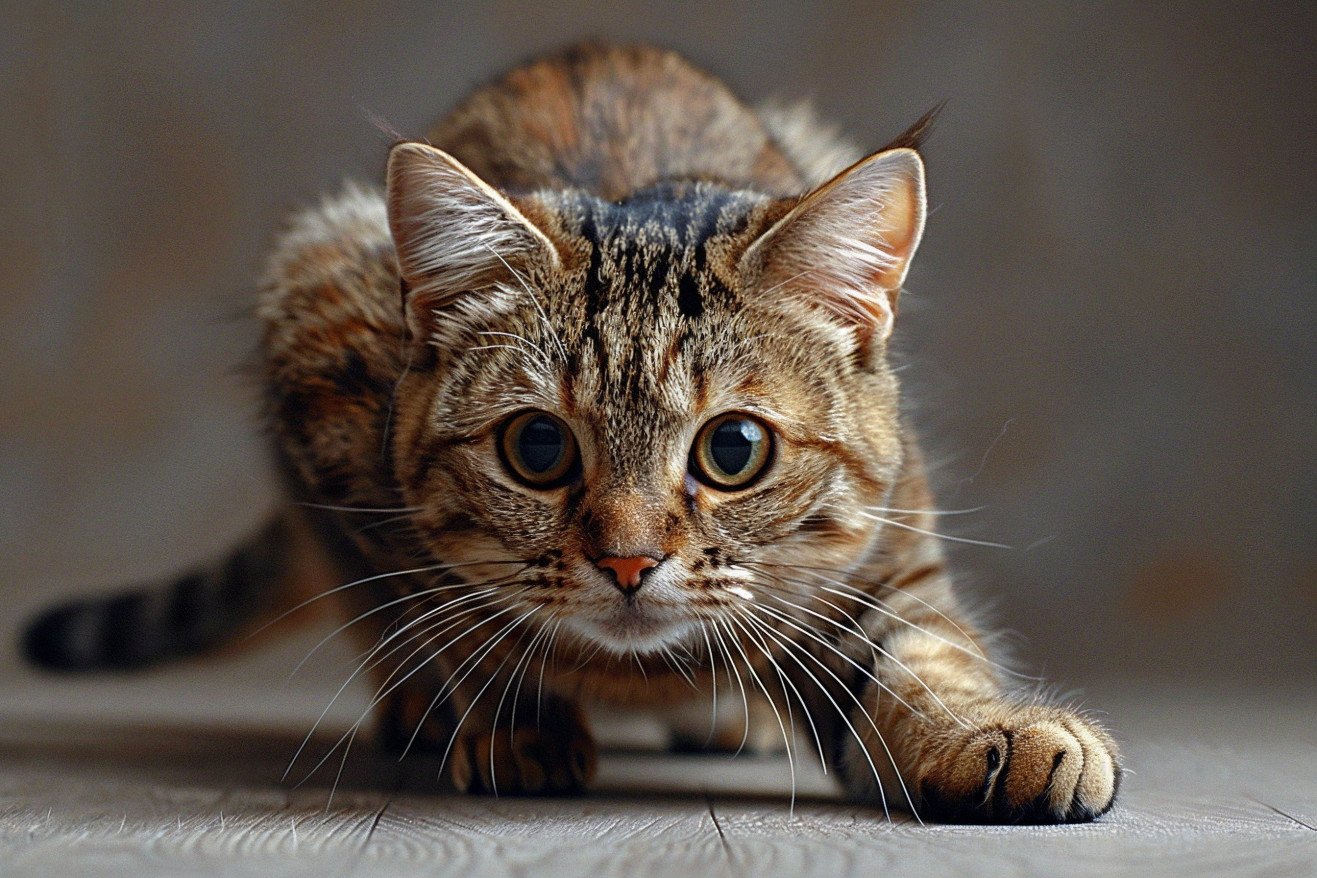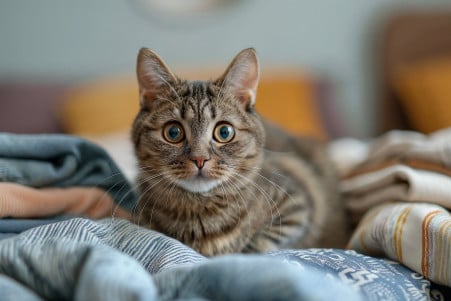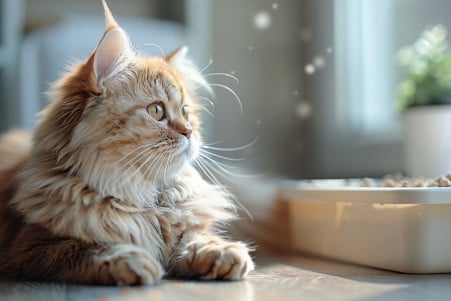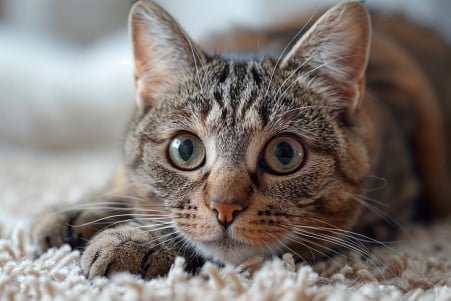Why Is My Male Cat Peeing Everywhere and Meowing Excessively? Causes Explained
3 April 2024 • Updated 1 April 2024

If your male cat has suddenly started urinating outside the litter box and meowing excessively, there could be several medical or behavioral explanations related to stress, marking territory, or underlying health issues. This disruptive behavior often signals a urinary tract infection, kidney disease, diabetes, or even stress from a household change that's causing him to mark his territory.
To better understand what's going on with your restless feline, we'll examine research from veterinarians and animal behaviorists on the potential medical reasons for inappropriate urination and excessive vocalizing in male cats. This overview will provide insights into common triggers, methods for diagnosis, treatment options, and environmental changes that may help resolve these issues once we identify the root cause.
Why is my male cat peeing everywhere and meowing so much?
Medical Reasons for Inappropriate Urination and Excessive Meowing in Male Cats
Urinary tract infections (UTIs) and cystitis can cause pain and discomfort when urinating in male cats, which can result in litter box avoidance and excessive vocalization. According to VetHelpDirect, symptoms of UTIs and cystitis include inflammation, blood in the urine, and the need to urinate more often outside the litter box.
Kidney disease and diabetes are other medical issues that can lead to inappropriate urination. According to Spring Creek Animal Hospital, the increased urine output associated with these conditions can lead to accidents, and the cat may also feel sick and be less likely to use the litter box.
Mobility problems like arthritis, especially in older cats, can make it difficult for cats to get in and out of the litter box or get in the right position to use it comfortably, which can lead to them urinating outside of it. Hyperthyroidism, which causes restlessness, increased appetite, and weight loss, can also lead to behavioral changes like excessive vocalization and inappropriate urination.
In the end, it’s important to see a vet for a complete evaluation. Urinalysis and blood tests are necessary to help determine and address any medical issues that may be causing a male cat to urinate inappropriately and vocalize excessively. Many of these issues can be treated and managed with the right medical care.
Behavioral Causes: Stress, Territorial Marking, and Litter Box Aversion
Stress from changes in the household, such as new people, pets, or routines, can lead to inappropriate urination and excessive meowing in male cats, according to The Spruce Pets. Meanwhile, intact male cats may also spray or mark territory with urine as a form of communication and mating behavior. This is because, according to Southpoint Animal Hospital, cats have scent glands on their face, paws, and tail base that they use to mark objects in their environment.
Litter box aversion can also be caused by negative associations, such as a bad experience or dislike of the litter type or box location, according to Spring Creek Animal Hospital. In multi-cat homes, conflicts and territorial marking can lead to inappropriate urination. These behavioral problems can be resolved by creating a stress-free environment, ensuring the litter box is set up correctly, and addressing any conflicts.
How to Prevent Urine Marking and Spraying in Male Cats
The most effective way to prevent urine marking and spraying in male cats is to have them neutered, which will lower their testosterone levels and reduce territorial behavior, according to Elanco. In addition, using pheromone products like Feliway can help cats feel more secure and less likely to mark their territory, says The Spruce Pets.
It's also important to clean any areas that have been marked with enzymatic cleaners to ensure that the cat can't smell the urine and is therefore less likely to return to the same spot, says WikiHow. Finally, providing enough resources, including litter boxes, scratching posts, and high perches, can help reduce territorial marking by giving the cat appropriate places to engage in these natural behaviors.
If the problem is especially severe or persistent, it may be necessary to consult a veterinarian or animal behaviorist, who can offer additional advice and may even be able to prescribe medication to address the root causes of the problem, according to WikiHow.
How to Get Rid of Cat Urine Smell
In addition to immediately blotting the urine and using an enzymatic cleaner to break down the bacteria that causes odors, ServiceMaster of Kalamazoo recommends re-saturating the area with water and reapplying the enzymatic cleaner for particularly strong odors.
Professional carpet cleaning companies that specialize in pet stain and odor removal can also be very helpful because they use a hot water extraction method to clean the carpet and have special tools to help them locate and treat the affected area, according to The Spruce Pets. It's also important to make sure that you don't use ammonia-based cleaners because they can attract the cat back to the same spot, according to the Indoor Pet Initiative at Ohio State University.
Make sure that you clean and deodorize any areas that have been soiled to make sure that your cat doesn't return to that area. In some cases, you may even need to replace padding or refinish hardwood floors to completely remove the smell, according to the Indoor Pet Initiative.
How to Reduce Stress and Enrich the Environment for Male Cats
To help reduce stress and territorial behavior in your male cat, make sure he has access to vertical space, sturdy scratching posts, and hiding spots, according to Rover.com. In addition, it's important to make sure the litter box is clean and easy to get to so that your cat doesn't develop litter box aversion and start having accidents, according to Pet Health Network.
To help reduce stress from environmental changes, make sure to introduce new things slowly and stick to a regular schedule, according to Cats.org.uk. You may also want to consider using calming pheromone diffusers or supplements to help cats who are feeling anxious or stressed, according to the Rover.com article.
In homes with multiple cats, make sure that there are enough resources to go around, including separate litter boxes and feeding stations, to help reduce conflict and territorial marking, according to Pet Health Network. By making sure that your cat's environment is stress-free and enriched, you can help deal with the root causes of your male cat's inappropriate urination and excessive meowing.
Conclusion: How to Deal With Inappropriate Urination and Excessive Meowing in Male Cats
Whether the cause is medical or behavioral, it's important to identify the root cause of a male cat's inappropriate urination and excessive meowing. In many cases, veterinary help will be needed to diagnose and treat underlying medical conditions or ongoing behavioral issues.
Behavioral problems can be addressed by managing the cat's environment, reducing stress, and ensuring the litter box is clean. Medical treatment, environmental enrichment, and behavior modification may all be needed and will require patience and consistency. With the right treatment and a willingness to learn about your cat's needs, these issues can often be resolved or managed successfully.


